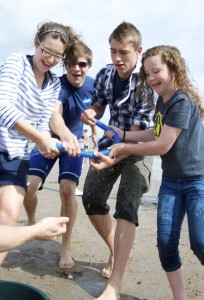Beach games
During the summer I went to North Wales with the youth group I help lead. While we were away, we played lots of games. Not high-tech, computer-based games but real-world, physical games. It was a timely reminder to me that play, even for teenagers, does not always depend on bits and bytes but can happily exist with a few bits and bobs. In fact, the simplicity added to the fun.
We played a variety of short games on the beach. Some were physical, collecting as much water as possible with a pipe drilled full of holes for example. Some were creative, such as making pictures with beach-combed artefacts. Some were simply sporty, such as volleyball. Almost all the games were faintly ridiculous.
The variety of games catered for everyone’s preference and skill and avoided the situation where any of the young people could feel excluded. They gave every one a chance to shine.
The young people played in teams. The competition was an important driver for participation and each game had a scoring system that rewarded achievement and more arbitrary factors such as teamwork and flair. Having said that, everyone recognised that the scoring was simply a device to provide structure and was at the whim of each of the game leader’s discretion. The scoring was wildly inconsistent but no-one really minded.
But team play is more than competition, it is dependent on collaboration. The games were designed to leave no-one behind – every game required everyone to participate. No-one could fail individually, but the team could succeed together.
These lo-tech games worked because they drew on the fundamentals of play:
- the society of shared voluntary activity,
- simple rules,
- clear goals,
- boundaries in time and space, and
- no material consequence
The morning on a breezy Welsh beach illustrated beautifully the simple joy of playing together.

